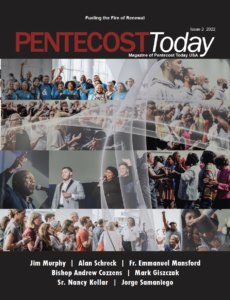Sixth Sunday of Easter
Meditation and Questions for Reflection or Group Discussion
Mass Readings:
1st Reading: Acts 15:1-2, 22-29 2nd Reading: Revelation 21:10-14, 22-23
Responsorial: Psalm 67:2-3, 5-6, 8 Gospel: John 14:23-29
Welcoming the Father, Son, and Holy Spirit into Our Hearts
Peace I leave with you. (John 14:27)
Rarely is a passage from Scripture as Trinitarian as these few verses in today’s Gospel. This passage comes from Jesus’ farewell address at the Last Supper: the final words that he gave his disciples before he was arrested and crucified (John 13-17). In these five chapters, Jesus speaks at length about himself, his Father, and the Holy Spirit. He talks about how God wants to draw every single person into the life of the Trinity, and he talks about the peace that comes to everyone who welcomes him and his Father and the Spirit into their hearts.
Today’s passage contains many of the themes that we find in these five chapters: The Father loves us. He wants to make his home in the hearts of everyone who loves him and keeps his word. The Holy Spirit has come to teach us and to fill us with his own divine life.
There is so much in this short passage! So try to take some time today to read it a few times slowly and prayerfully. Take note of how much Jesus teaches about God’s love—in just a few verses. Then thank him for welcoming you into this love through each Person of the Trinity.
Even though the Trinity is a mystery of our faith, we don’t have to understand it perfectly to experience the peace that God wants to give us. Few of us know how a watch, a car, or a computer works. But that doesn’t keep us from reaping the benefits of these things. It’s the same with God. When Jesus says, “Peace I leave with you,” we don’t have to understand everything about that peace. We can just rest in this gift and let it fill our hearts.
This peace is not just a warm feeling. It’s the grace to be holy and to resist evil. It’s the grace to forgive. It’s the grace to remind us that God is with us and that we have nothing to fear (John 14:27). It’s the spiritual tranquility that comes from the Father, the Son, and the Holy Spirit. He is such a generous God!
“Jesus, I want to be filled with your peace now and always.”
Download reflections and discussion questions here
(Many thanks to The Word Among Us (www.wau.org) for allowing us to use meditations from their monthly devotional magazine. Used with permission.)
Sunday, May 1, 2016
Questions for Reflection or Discussion
- The reading from Acts in the First Reading tells us of the importance of unity and how the early Christians worked together “with one accord” to resolve conflicts. We read of the lengths they went to avoid splits and factions. Are there any areas in your life, your family’s life, or the life of your parish where there is disunity? What steps can you take to be a peacemaker and a resolver of conflicts?
- The Responsorial Psalm begins with these words: “May God have pity on us and bless us; may he let his face shine upon us.” In what ways do these words apply to you personally, and to us as a nation?
- The response in the Responsorial Psalm is “O God, let all the nations praise you!” What reasons do you have to personally praise the Lord? Why do we as Americans need to especially praise God?
- The Second Reading from the Book of Revelation speaks of our new heavenly city. All its imagery (precious stone, jasper, crystal) is a symbolic attempt to express the inexpressible wonder of living eternally with God. But we are so practiced to thinking only of the present world, we may find it difficult to think about or “desire” heaven. However, our life on earth is very short. Our life in heaven is very long. How important to you is it to focus on your future life with God? What can you do to allow the reality of your heavenly destiny to have a greater impact on how you live your life?
- The Second Reading ends with these words: “I saw no temple in the city for its temple is the Lord God almighty and the Lamb. The city had no need of sun or moon to shine on it, for the glory of God gave it light, and its lamp was the Lamb.” What do these words mean to you?
- The Gospel Reading begins with these words: “Whoever loves me will keep my word, and my Father will love him, and we will come to him and make our dwelling with him.” What is your understanding of these words of Jesus? What steps can you take to deepen the life and love of Christ that is within you?
- The meditation summarizes the Gospel Reading with these words: “The Father loves us. He wants to make his home in the hearts of everyone who loves him and keeps his word. The Holy Spirit has come to teach us and to fill us with his own divine life.” What steps can you take to open your heart in a greater way to the work of the Father, Son, and Holy Spirit?
- In the meditation, we also hear these words: “Even though the Trinity is a mystery of our faith, we don’t have to understand it perfectly to experience the peace that God wants to give us.” What is the difference between this “peace that God wants to give us” and the peace that the world gives?
- The meditation ends with these words: “This peace is not just a warm feeling. It’s the grace to be holy and to resist evil. It’s the grace to forgive. It’s the grace to remind us that God is with us and that we have nothing to fear (John 14:27). It’s the spiritual tranquility that comes from the Father, the Son, and the Holy Spirit. He is such a generous God!” Do you know this peace? What can you do to experience it more deeply, and give it away to others?
- Take some time now to pray and ask the Lord to give you a greater experience of his peace.Use the prayer at the end of the meditation as a starting point.
[The discussion questions were created by Maurice Blumberg, a director of partner relations for The Word Among Us Partners, (http://www.waupartners.org/); a ministry of The Word Among Us (www.wau.org) to the military, prisoners, women with crisis pregnancies or who have had abortions, and college students. He is also a member of the National Service Committee Council of the Catholic Charismatic Renewal. Maurice was also the founding Executive Director of the National Fellowship of Catholic Men, for which he is currently a Trustee (http://www.nfcmusa.org/). He can be contacted at (Enable Javascript to see the email address) mblumberg@wau.org or (Enable Javascript to see the email address) mblumberg@aol.com.]


 Click Here for us to pray for your intentions through our new website.
Click Here for us to pray for your intentions through our new website. 
